外研版(2019)选择性必修第二册Unit 4 Breaking boundaries Understanding ideas 课件(38张ppt)
文档属性
| 名称 | 外研版(2019)选择性必修第二册Unit 4 Breaking boundaries Understanding ideas 课件(38张ppt) |

|
|
| 格式 | pptx | ||
| 文件大小 | 19.2MB | ||
| 资源类型 | 教案 | ||
| 版本资源 | 外研版(2019) | ||
| 科目 | 英语 | ||
| 更新时间 | 2022-10-30 00:00:00 | ||
图片预览



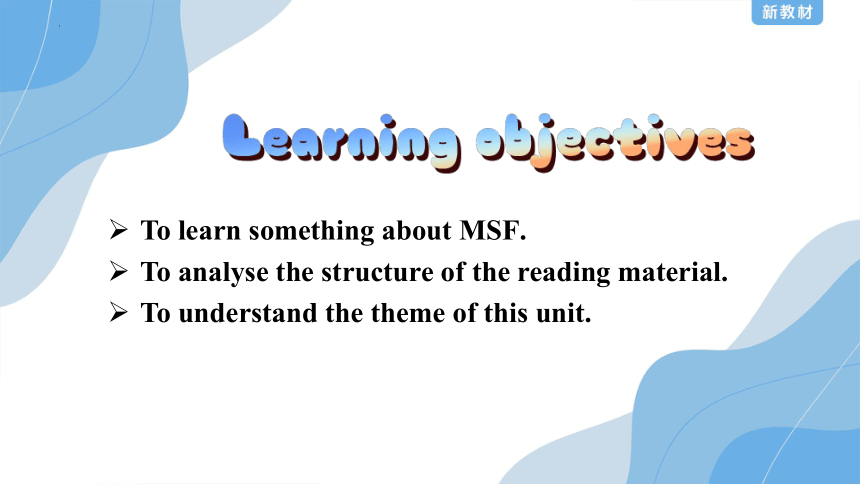

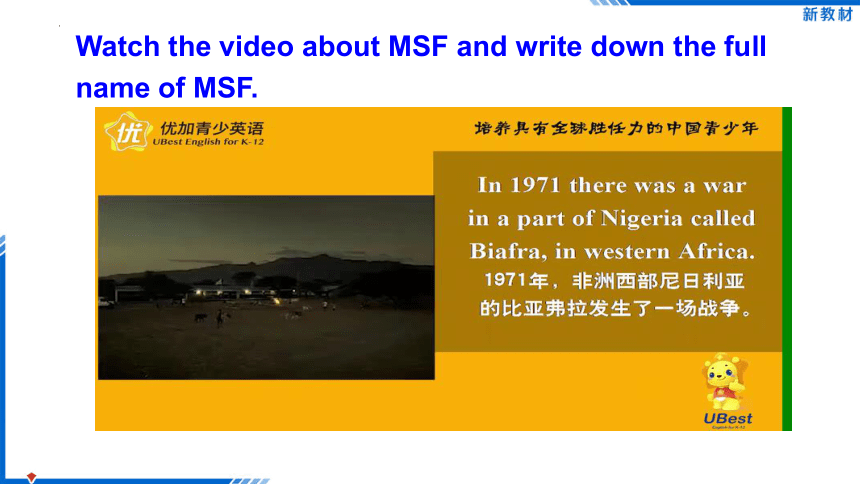
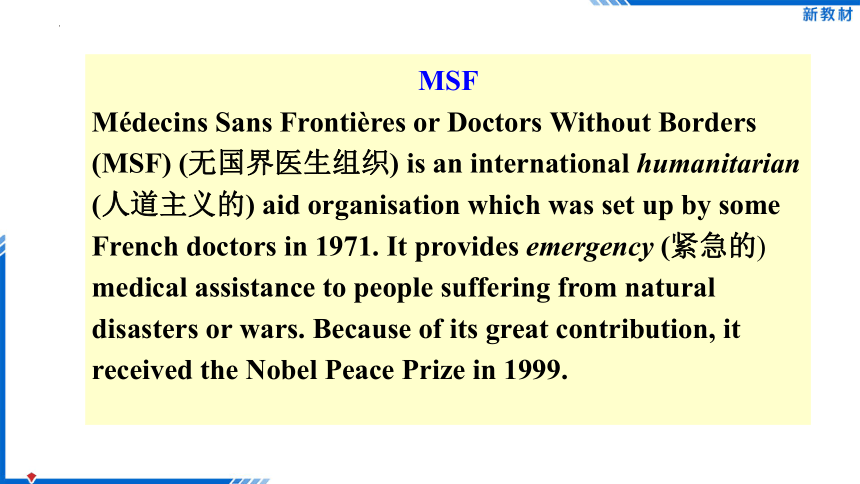
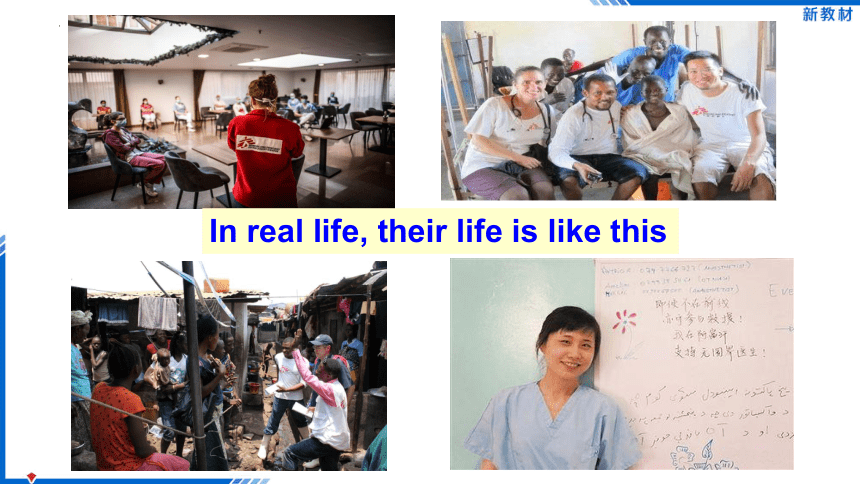
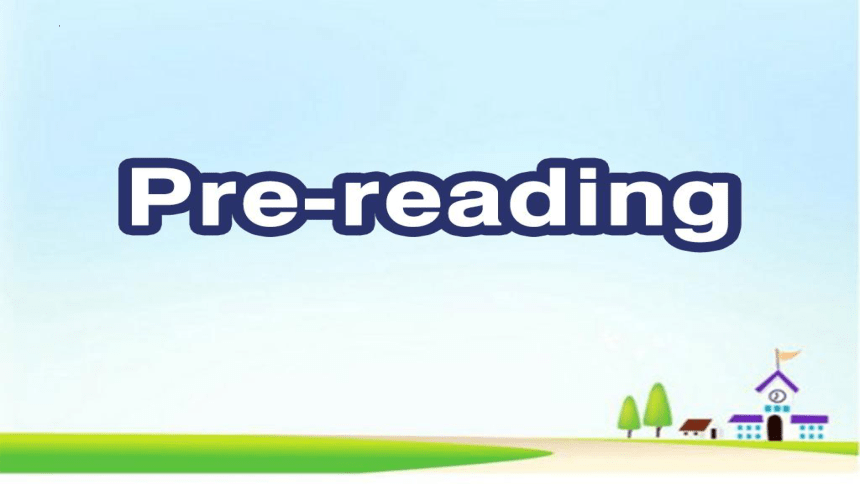
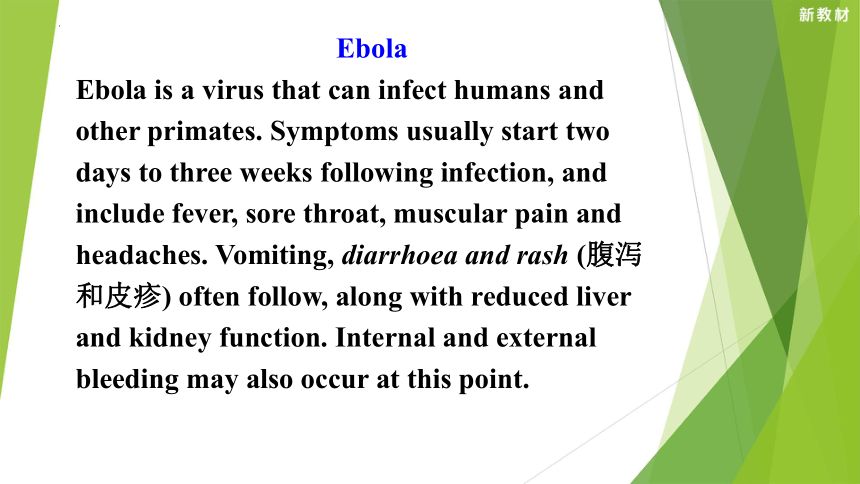

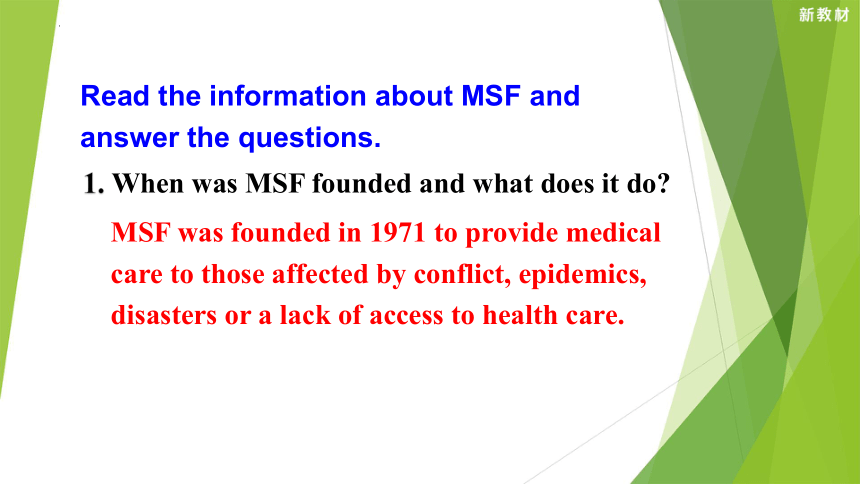
文档简介
(共38张PPT)
Unit 4
Unit 4
Breaking boundaries
MY 100 DAYS WITH MSF
To learn something about MSF.
To analyse the structure of the reading material.
To understand the theme of this unit.
Watch the video about MSF and write down the full name of MSF.
MSF
Médecins Sans Frontières or Doctors Without Borders (MSF) (无国界医生组织) is an international humanitarian (人道主义的) aid organisation which was set up by some French doctors in 1971. It provides emergency (紧急的) medical assistance to people suffering from natural disasters or wars. Because of its great contribution, it received the Nobel Peace Prize in 1999.
In real life, their life is like this
Ebola
Ebola is a virus that can infect humans and other primates. Symptoms usually start two days to three weeks following infection, and include fever, sore throat, muscular pain and headaches. Vomiting, diarrhoea and rash (腹泻和皮疹) often follow, along with reduced liver and kidney function. Internal and external bleeding may also occur at this point.
The average death rate of those infected is about 50%. Ebola was first identified in 1976 in a village near the Ebola River, in the Democratic Republic of the Congo. Outbreaks tend to occur in tropical regions of sub-Saharan Africa, the largest to date being the 2013-2016 epidemic in West Africa, which infected 28, 616 people and claimed 11, 310 lives.
1. When was MSF founded and what does it do
MSF was founded in 1971 to provide medical care to those affected by conflict, epidemics, disasters or a lack of access to health care.
Read the information about MSF and answer the questions.
While reading, we can find different expressions to show the same meaning. For example, in the passage, the writer uses “ It provides...” to introduce its work.
2. What is the top priority of MSF
The top priority goes to those in the most serious and immediate danger.
n. 优先处理的事,当务之急
3. What else do you know about it
Since receiving the Nobel Peace Prize in 1999, Médecins Sans Frontières (MSF) has been in the spotlight, with more than 6.3 million donors worldwide.
Read the journal of an MSF doctor and find out what problem he was involved in tackling.
The doctor was involved in tacking the infectious disease Ebola in Liberia.
Read the passage again and decide whether the following statements are True (T) or False (F).
1. “Ebola doesn’t respect national boundaries” in Paragraph 2 means that people all around the world can be easily infected with this terrible disease. ( )
2. Emma talked me through the daily routine in the staff room for an hour. ( )
T
T
3. I was not the only Chinese doctor among people of all ages, colours and beliefs, from every continent except Antarctica.
( )
4. As a member of MSF, we never give up on a patient, and our efforts do sometimes end in miracles. ( )
5. Gabriel and Daniel’s parents and sisters died of Ebola. ( )
6. In a few days, someone from MSF will arrive to take my place at the end of my posting. ( )
F
T
T
T
Choose the ideas conveyed in the passage and find evidence to support your choices.
1. It is not the first time the author has worked with MSF.
2. The work with MSF in Liberia is life-threatening.
3. The author enjoyed working together with all his colleagues.
4. The author always felt frustrated with the high death rate.
Now use five adjectives to describe the spirit of MSF doctors and give your reasons.
devoted
persistent
selfless
caring
brave
Time Experiences Feelings
Before arrival How I made up my mind:
I saw the tragic scenes on the news and I felt it was my duty as a doctor to go there and offer my help
with strong sense of mission
Organise information from the passage and complete the table.
Time Experiences Feelings
My 100 days What I did on arrival: What my daily work was like: An unforgettable case:
Two young brothers survived the disease after their family members had died.
I got to know the daily routine and my colleagues and started my work.
Together with the others working for or alongside MSF, I helped those who were infected with the terrible disease Ebola. We worked together, surrounded by blood, vomit and death.
proud, hopeful, amazed
Time Experiences Feelings
Now What is special about today: What we are doing:
We celebrated because it’s exactly one month since the last reported case, and my time is almost up.
We are celebrating to create a global community with a shared future of peace and prosperity.
happy,inspired, proud, hopeful
Now read the information and answer the questions.
We call on the people of all countries to work together to build a community with a shared future for mankind, to build an open, inclusive, clean, and beautiful world that enjoys lasting peace, universal security, and common prosperity.
From Xi Jinping’s report at the 19th CPC National Congress
1. What is your understanding of “ a community with a shared future for mankind”
All people live on the same earth, as if we were living in a “global village”. Anyone’s action will affect others. Only when all people on the earth work together can the world have great development.
2. How is the idea reflected in the MSF doctor’s journal
The author mentioned that Ebola has no respect for borders. Thus indicates that borders are artificial. Many human differences are similarly artificial or unimportant when compared to what unites people. Doctors and others involved in the fight against the disease were united by their common values of respecting and saving human life.
Below is the summary of the text with some content missing. Choose the right item from the box and make the summary complete.
a. I arrived in Liberia with MSF almost three months ago
b. We knew there was little hope for the remaining brothers
c. MSF members will go on the tireless work
d. I felt it was my duty as a doctor to go there and offer my help
When I saw the tragic scenes caused by Ebola on the news,
1) _____. So, as the only Chinese doctor, 2) _____. My mission was to relieve a Canadian specialist in infectious diseases, Emma. Upon my arrival, there was an unforgettable case where a family of six were infected and four of them soon died.
3) ______, but we did everything we could to save them so that both boys have made a full recovery. Today we celebrate because there have been no reported cases for a month. Though my time is almost up, 4) ______.
d
a
b
c
1. What is your understanding of the first sentence in Paragraph 6
To be caught up in such a crisis creates powerful bonds between people, not only between carers and patients, but also between all those who have come from different parts of the world and joined together in a common cause.
MSF emphasizes that there are no borders in the face of disease.
This small but unexpected success compensated for many other less fortunate cases.
2. What difficulties do you think the author might have faced during his work
We have worked together, surrounded by blood, vomit and death.
The author might have to face death, the bad working conditions, and have difficulty in language.
As she talked, I could hear at least three different languages being spoken at the tables...
3. Do you know of any other similar organisations
What do they do
World Wildlife Fund
(WWF)
WWF has been active in China since 1980, when Dr. George Schaller arrived to work with Chinese scientists on field studies of the behaviour and ecology of the giant panda.
As the first international conservation organisation
invited to work in China, WWF faced not only the
problems of carrying out field research in the panda’s rugged,
inaccessible mountain home, but also the cultural and
political challenges of engaging in international
cooperation in the early days of China’s opening to the
outside world.
International Committee of the Red Cross
To protect victims of internal and international armed conflicts.
4. What have you learnt from the passage that can help
you talk about “a community with a shared future”
Search for more information about a NGO (non-governmental organisation) which you are interested in, and write a short passage about it or about your ideas in about 100 words.
Unit 4
Unit 4
Breaking boundaries
MY 100 DAYS WITH MSF
To learn something about MSF.
To analyse the structure of the reading material.
To understand the theme of this unit.
Watch the video about MSF and write down the full name of MSF.
MSF
Médecins Sans Frontières or Doctors Without Borders (MSF) (无国界医生组织) is an international humanitarian (人道主义的) aid organisation which was set up by some French doctors in 1971. It provides emergency (紧急的) medical assistance to people suffering from natural disasters or wars. Because of its great contribution, it received the Nobel Peace Prize in 1999.
In real life, their life is like this
Ebola
Ebola is a virus that can infect humans and other primates. Symptoms usually start two days to three weeks following infection, and include fever, sore throat, muscular pain and headaches. Vomiting, diarrhoea and rash (腹泻和皮疹) often follow, along with reduced liver and kidney function. Internal and external bleeding may also occur at this point.
The average death rate of those infected is about 50%. Ebola was first identified in 1976 in a village near the Ebola River, in the Democratic Republic of the Congo. Outbreaks tend to occur in tropical regions of sub-Saharan Africa, the largest to date being the 2013-2016 epidemic in West Africa, which infected 28, 616 people and claimed 11, 310 lives.
1. When was MSF founded and what does it do
MSF was founded in 1971 to provide medical care to those affected by conflict, epidemics, disasters or a lack of access to health care.
Read the information about MSF and answer the questions.
While reading, we can find different expressions to show the same meaning. For example, in the passage, the writer uses “ It provides...” to introduce its work.
2. What is the top priority of MSF
The top priority goes to those in the most serious and immediate danger.
n. 优先处理的事,当务之急
3. What else do you know about it
Since receiving the Nobel Peace Prize in 1999, Médecins Sans Frontières (MSF) has been in the spotlight, with more than 6.3 million donors worldwide.
Read the journal of an MSF doctor and find out what problem he was involved in tackling.
The doctor was involved in tacking the infectious disease Ebola in Liberia.
Read the passage again and decide whether the following statements are True (T) or False (F).
1. “Ebola doesn’t respect national boundaries” in Paragraph 2 means that people all around the world can be easily infected with this terrible disease. ( )
2. Emma talked me through the daily routine in the staff room for an hour. ( )
T
T
3. I was not the only Chinese doctor among people of all ages, colours and beliefs, from every continent except Antarctica.
( )
4. As a member of MSF, we never give up on a patient, and our efforts do sometimes end in miracles. ( )
5. Gabriel and Daniel’s parents and sisters died of Ebola. ( )
6. In a few days, someone from MSF will arrive to take my place at the end of my posting. ( )
F
T
T
T
Choose the ideas conveyed in the passage and find evidence to support your choices.
1. It is not the first time the author has worked with MSF.
2. The work with MSF in Liberia is life-threatening.
3. The author enjoyed working together with all his colleagues.
4. The author always felt frustrated with the high death rate.
Now use five adjectives to describe the spirit of MSF doctors and give your reasons.
devoted
persistent
selfless
caring
brave
Time Experiences Feelings
Before arrival How I made up my mind:
I saw the tragic scenes on the news and I felt it was my duty as a doctor to go there and offer my help
with strong sense of mission
Organise information from the passage and complete the table.
Time Experiences Feelings
My 100 days What I did on arrival: What my daily work was like: An unforgettable case:
Two young brothers survived the disease after their family members had died.
I got to know the daily routine and my colleagues and started my work.
Together with the others working for or alongside MSF, I helped those who were infected with the terrible disease Ebola. We worked together, surrounded by blood, vomit and death.
proud, hopeful, amazed
Time Experiences Feelings
Now What is special about today: What we are doing:
We celebrated because it’s exactly one month since the last reported case, and my time is almost up.
We are celebrating to create a global community with a shared future of peace and prosperity.
happy,inspired, proud, hopeful
Now read the information and answer the questions.
We call on the people of all countries to work together to build a community with a shared future for mankind, to build an open, inclusive, clean, and beautiful world that enjoys lasting peace, universal security, and common prosperity.
From Xi Jinping’s report at the 19th CPC National Congress
1. What is your understanding of “ a community with a shared future for mankind”
All people live on the same earth, as if we were living in a “global village”. Anyone’s action will affect others. Only when all people on the earth work together can the world have great development.
2. How is the idea reflected in the MSF doctor’s journal
The author mentioned that Ebola has no respect for borders. Thus indicates that borders are artificial. Many human differences are similarly artificial or unimportant when compared to what unites people. Doctors and others involved in the fight against the disease were united by their common values of respecting and saving human life.
Below is the summary of the text with some content missing. Choose the right item from the box and make the summary complete.
a. I arrived in Liberia with MSF almost three months ago
b. We knew there was little hope for the remaining brothers
c. MSF members will go on the tireless work
d. I felt it was my duty as a doctor to go there and offer my help
When I saw the tragic scenes caused by Ebola on the news,
1) _____. So, as the only Chinese doctor, 2) _____. My mission was to relieve a Canadian specialist in infectious diseases, Emma. Upon my arrival, there was an unforgettable case where a family of six were infected and four of them soon died.
3) ______, but we did everything we could to save them so that both boys have made a full recovery. Today we celebrate because there have been no reported cases for a month. Though my time is almost up, 4) ______.
d
a
b
c
1. What is your understanding of the first sentence in Paragraph 6
To be caught up in such a crisis creates powerful bonds between people, not only between carers and patients, but also between all those who have come from different parts of the world and joined together in a common cause.
MSF emphasizes that there are no borders in the face of disease.
This small but unexpected success compensated for many other less fortunate cases.
2. What difficulties do you think the author might have faced during his work
We have worked together, surrounded by blood, vomit and death.
The author might have to face death, the bad working conditions, and have difficulty in language.
As she talked, I could hear at least three different languages being spoken at the tables...
3. Do you know of any other similar organisations
What do they do
World Wildlife Fund
(WWF)
WWF has been active in China since 1980, when Dr. George Schaller arrived to work with Chinese scientists on field studies of the behaviour and ecology of the giant panda.
As the first international conservation organisation
invited to work in China, WWF faced not only the
problems of carrying out field research in the panda’s rugged,
inaccessible mountain home, but also the cultural and
political challenges of engaging in international
cooperation in the early days of China’s opening to the
outside world.
International Committee of the Red Cross
To protect victims of internal and international armed conflicts.
4. What have you learnt from the passage that can help
you talk about “a community with a shared future”
Search for more information about a NGO (non-governmental organisation) which you are interested in, and write a short passage about it or about your ideas in about 100 words.
